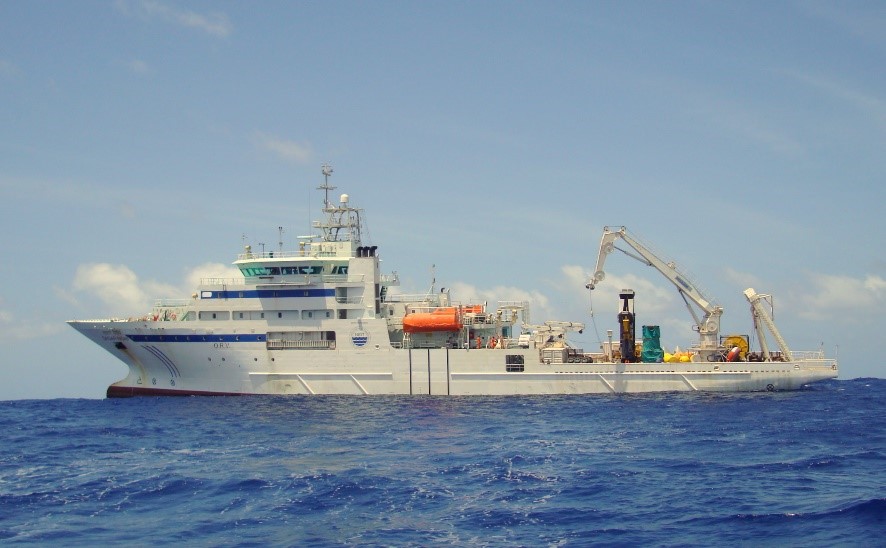SAGAR NIDHI
 Disclaimer: Copyright infringement not intended.
Disclaimer: Copyright infringement not intended.
Context
- Scientists from Bangladesh and Mauritius embarked onboard India’s research vessel Sagar Nidhi on June 29 to participate in a joint ocean expedition.
Details
- The event took place under the framework of the Colombo Security Conclave (CSC) between the nations of the Indian Ocean Region (IOR).
- The expedition will last nearly 35 days. The cruise is conducted by Indian National Centre for Ocean Information Services (INCOIS) under the Ministry of Earth Sciences.
- The scientists will collaboratively research ocean data to predict and manage changes in the marine environment and variations in ocean parameters.
- The decision to embark on the expedition was a direct outcome of the maiden CSC Oceanographers and Hydrographers conference held at Goa and Hyderabad in November 2022.
ORV Sagar Nidhi
- ORV Sagar Nidhi is an ice-strengthened multidisciplinary vessel operated by the National Institute of Ocean Technology, India.
- It was constructed at Fincantieri, Italy.
- The 104-metre-long vessel has fully automatic diesel-electric propulsion equipped with dynamic positioning system, azimuth thrusters, and a winch to hoist 60 tonnes from a depth of 6,000 metres.
- The vessel is capable of carrying out geo-scientific, meteorological and oceanographic research, and is designed with blue-water capability with ranges of up to 10,000 nautical miles (19,000 km) for voyages lasting up to 45 days.
- She is expected to support research in the Indian and Antarctic Oceans.
- Sagar Nidhi will be utilized for deep sea mining, launching of ROV's, AUV's, manned and unmanned submersibles and exploration of gas hydrates.
Colombo Security Conclave
- India has sought to enhance security cooperation with the Indian Ocean island and littoral nations, through a new ‘minilateral’ group called the Colombo Security Conclave (CSC).
- Held at the National Security Advisor (NSA)-level, the CSC, which brings together India, Sri Lanka, Maldives, and Mauritius, along with Bangladesh and the Seychelles as observers.
- It is now the most active security-focused group operating in the Indian Ocean region.
- The CSC’s remit includes maritime security, countering terrorism, and cybersecurity. The small group provides an opportunity for India to address its own strategic concerns in the Indian Ocean while providing an opportunity for the island and littoral nations to address their own challenges.
History and Evolution
- The CSC evolved out of trilateral meetings between NSAs and Deputy NSAs from India, Maldives, and Sri Lanka, starting in
- Since its revival and re-branding as the CSC in 2020, Mauritius was added as a member of the grouping, with Bangladesh and the Seychelles as observers. A secretariat for the group was established in Colombo in 2021.
- The group has operationalised practical cooperation under the CSC by hosting regular security-focused exercises.
- Since July 2021, the CSC’s exercises have included on maritime search and rescue; cybersecurity; coastal security; and investigation of terrorism cases.
Challenges and Solutions
- The CSC will need to address several key challenges to enhance its impact. First, if the CSC does expand its membership, it should not duplicate the work of the other Indian Ocean region multilateral groups. The effectiveness of the CSC’s limited membership and scope has been demonstrated in the regularity of the CSC’s dialogues at the NSA and Deputy NSA-level, along with security-focused exercises.
- The CSC countries are all members of the two region-wide Indian Ocean groupings, the Indian Ocean Rim Association (IORA), and the Indian Ocean Naval Symposium (IONS). However, the lack of coordination between the IORA and the IONS has hindered the effective functioning of these institutions. To encourage coordination, the CSC could include the rotating country Chairs of IORA and IONS, as observers.
- Second, the group will be vulnerable to domestic political changes unless it can better institutionalize itself within the participant’s systems. The CSC should seek to insulate itself from the impact of changes in governments through, for example, establishing working groups at the senior official level.
- Third, with the CSC subsuming the former India-Sri Lanka-Maldives maritime security dialogue, India does not currently hold a regular and dedicated bilateral maritime security dialogue with any of the other five CSC countries. Therefore, to ensure a focus on shared maritime concerns in the CSC, India could establish bilateral maritime security dialogues with each of the island and littoral nations, to complement the CSC process.
Closing Remarks
- There is an immense need for cooperation in the IOR given the rising number of security issues and uncertainties.
- The CSC is more likely to succeed if it maintains a common strategic vision and does not get bogged down on the growing Chinese influence in the region.
|
PRACTICE QUESTION Q. There is an immense need for cooperation in the Indian Ocean Region given the rising number of security issues and uncertainties and the Colombo Security Conclave is more likely to succeed if it maintains a common strategic vision and does not get bogged down on the growing Chinese influence in the region. Comment. |





1.png)
